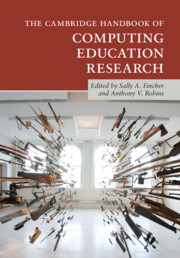Book contents
- The Cambridge Handbook of Computing Education Research
- The Cambridge Handbook of Computing Education Research
- Copyright page
- Dedication
- Contents
- Figures
- Tables
- Contributors
- Acknowledgments
- 0 An Important and Timely Field
- Part I Background
- Part II Foundations
- Part III Topics
- Systemic Issues
- New Milieux
- Systems Software and Technology
- Teacher and Student Knowledge
- 24 Teacher Knowledge for Inclusive Computing Learning
- 25 Teacher Learning and Professional Development
- 26 Learning Outside the Classroom
- 27 Student Knowledge and Misconceptions
- 28 Motivation, Attitudes, and Dispositions
- 29 Students As Teachers and Communicators
- Case Studies
- Index
- References
25 - Teacher Learning and Professional Development
from Teacher and Student Knowledge
Published online by Cambridge University Press: 15 February 2019
- The Cambridge Handbook of Computing Education Research
- The Cambridge Handbook of Computing Education Research
- Copyright page
- Dedication
- Contents
- Figures
- Tables
- Contributors
- Acknowledgments
- 0 An Important and Timely Field
- Part I Background
- Part II Foundations
- Part III Topics
- Systemic Issues
- New Milieux
- Systems Software and Technology
- Teacher and Student Knowledge
- 24 Teacher Knowledge for Inclusive Computing Learning
- 25 Teacher Learning and Professional Development
- 26 Learning Outside the Classroom
- 27 Student Knowledge and Misconceptions
- 28 Motivation, Attitudes, and Dispositions
- 29 Students As Teachers and Communicators
- Case Studies
- Index
- References
Summary
- Type
- Chapter
- Information
- The Cambridge Handbook of Computing Education Research , pp. 727 - 748Publisher: Cambridge University PressPrint publication year: 2019
References
- 3
- Cited by

